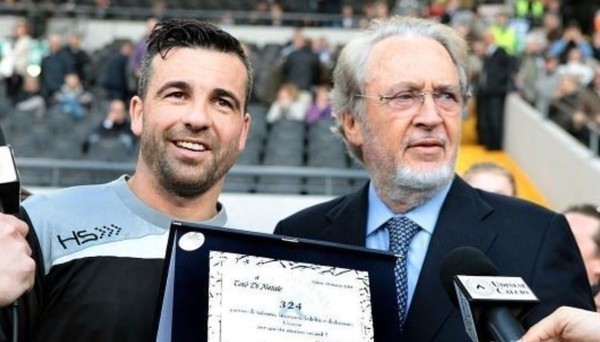
On 28 July 1986, Gianpaolo Pozzo officially became the majority shareholder of Udinese Calcio, following in the footsteps of Lamberto Mazza, who’d been at the helm since June 1981. Pozzo was in fact the only person in the running as other candidates pulled out, possibly due to being scared by rumours that linked Udinese with the Totonero match-fixing scandal. Pozzo, however, would not give in and he has now headed up the club for 36 years, showcasing principles such as a sense of belonging to Friuli and the city of Udine, which the club is a proud ambassador of. Innovation is a similarly important value that has been on display over the years. An example of this is Dacia Arena, the second club-owned stadium built in Italy and a venue that embodies an aspirational model on the European stage. It is the envy of many other cities and is now attracting a wider fan base to Udine.
Times were tough in the early days, with the club reeling from the sales of players such as Andrea Carnevale to Napoli, Luigi De Agostini to Verona and Marco Baroni to Roma. Just Edinho and Paolo Miano remained from the big hitters, but the worst was yet to come. On 28 August 1986, Udinese were slapped with a nine-point deduction by the disciplinary committee.
Pozzo had to decide if he should try to pull together a young team or attempt the impossible escape. He went for the latter by buying World Cup winners Francesco Graziani, Fulvio Collovati and Daniel Bertoni, but it was to no avail. The club finished bottom of the pile with 15 points, but would’ve reached safety without the points penalty. Pozzo rebuilt the squad, helping Udinese earn yo-yo status in the late 1980s and early 1990s when a string of promotions to and relegations from Serie A took place. “It won’t always be like this,” Pozzo often said. “We need to resolve the problems that we’ve inherited from the previous ownership. Then we can start making plans to increase the level of quality in the team by making it stronger and more competitive, including in Europe.”
And so it proved to be the case. Pozzo was able to correct the previous mistakes and his son Gino, a business administration graduate from the American University in Washington, swiftly began to showcase the skills of an experienced business manager, while Udinese began a new and more ambitious era after clinching promotion to the top flight in 1994/95. The team has remained in Serie A ever since, kickstarting a period of impressive consistency and success.
The club was able to attract incredible talents to the club (such as Oliver Bierhoff and Marcio Amoroso), boosted by an intelligent understanding of the Bosman ruling, culminating in European football coming to town in 1996/97.
Over the last 25 years, so many household names have donned the club’s colours. Antonio Di Natale is, of course, top of the list, but other standout names include: Alexis Sanchez, Oliver Bierhoff, Marcio Amoroso, David Pizarro, Abel Balbo, Nestor Sensini, Fabio Rossitto, Valerio Bertotto, Alessandro Calori, Thomas Helveg, Martin Jorgensen, Giuliano Giannichedda, Paolino Poggi, Stefano Fiore, Fabio Quagliarella, Vincenzo Iaquinta, Marek Jankulowski, Giampiero Pinzi, Felipe Dalbelo, Sulley Muntari, Cristian Zapata, Mauricio Isla, Kwadwo Asamoah, Gokhan Inler, Samir Handanovic, Dusan Basta, Medhi Benatia, Roberto Pereyra, Juan Guillermo Cuadrado, Marques Loureiro Allan, Piotr Zielinski, Bruno Fernandes, Juan Musso, Rodrigo De Paul, Gerard Deulofeu, Nahuel Molina, Destiny Udogie, Betuncal Beto.
THE NEW STADIUM – The latest major investment by Pozzo was the revamping of the Stadio Friuli, with the club taking on the costs, into the venue that is now known as Dacia Arena. The works began in 2014 and were completed in January 2016, unearthing a true gem of a stadium, as shown by the decision to use it to host the U21 Euro final on 30 June 2019.
RESULTS – The upcoming campaign will be Udinese’s 28th in a row in the top flight, which is a record among provincial clubs. During this time, the team has finished third twice, fourth twice, fifth once and seventh twice, with the stint peppered with numerous memorable European appearances.



